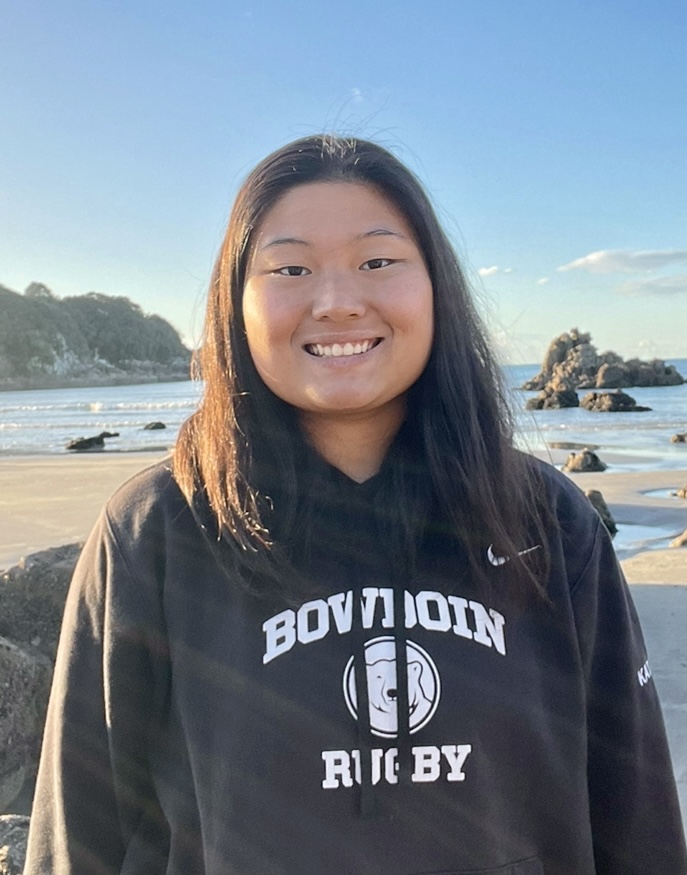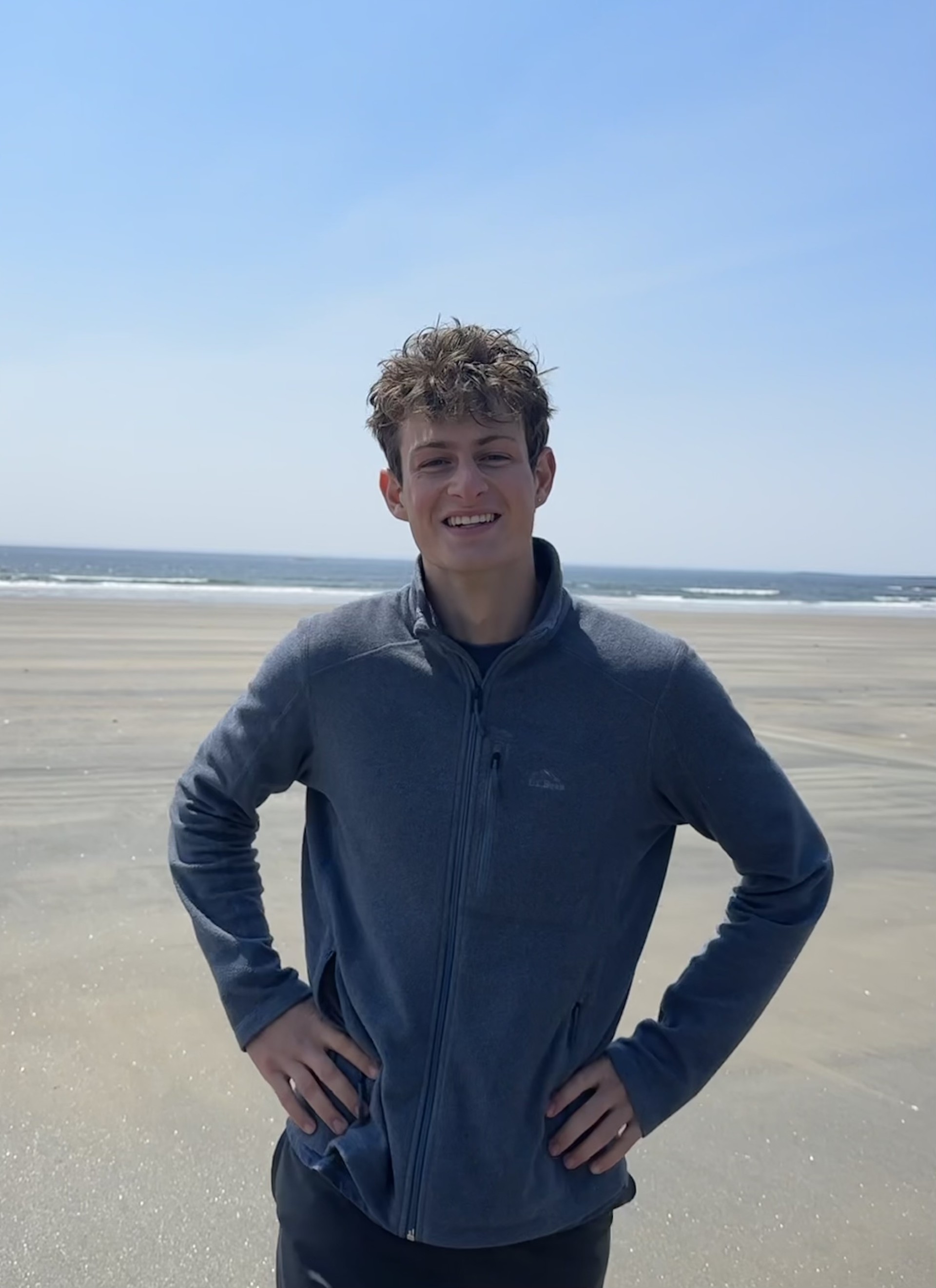Q&A with Future Asia Fellows: Runa Katayama ’25 and Sam Berets ’25
By Julie Hatano



This year, two Bowdoin seniors, Runa Katayama and Sam Berets, are heading to East Asia through prestigious post-graduate fellowships that serve cross-cultural exchange and community building. Katayama will be working at Niizawa Sake Brewery in Kawasaki, Miyagi through Princeton in Asia (PIA), while Berets will be teaching English in Yilan, Taiwan, as part of the Fulbright English Teaching Assistant (ETA) Program. Berets was additionally awarded a JET Program spot, and he hopes to similarly work as a teacher through Fulbright. Both the PIA and Fulbright fellowships encourage immersive learning, cultural curiosity, and the mutual building of global bridges. Katayama and Berets’ stories reflect the experience I and many have felt through the Japanese Department: an openness to change, a commitment to understanding others, and the courage to leap into something unfamiliar.
Q&A with Runa Katayama ’25
What exactly is the PIA? How does it differ from other abroad Japan fellowships?
PiA offers fellowships that allow cultural immersion and fosters mutual appreciation and cross-cultural understanding between the United States and Asia. I think it’s different from other fellowships because it offers a variety of placements in Japan that isn’t just teaching English. It seems like the placements really challenge you to immerse yourself into the Japanese community and navigate the lifestyle there.
What drew you to the PIA program? Why the PIA and not another fellowship?
Initially, I narrowed down to PiA because it was one of the few fellowships that allowed me to go back to Japan even if I have a Japanese nationality. For context, I was born in Japan but pretty much grew up most of my life in the U.S., so I wanted to use my gap year to figure out my Japanese side of identity and experience what it’s like to live in Japan as a Japanese person. I also thought the mission of PiA aligned with my past experiences. I grew up volunteering/interning with the Japan-America Society of Houston and my work there exemplified that the missions of fostering mutual appreciation and cross-cultural understanding between U.S. and Asia. When I read this mission, it resonated with a lot of me because I realized that at the time I was helping them, I was gaining the skills to be a cultural exchange ambassador, and I use those skills pretty much in my personal life, as well when I interact with my friends. So, then I thought, what would it be like if I used those skills in Japan too and not just in the U.S.?
What do you hope to gain or learn, both personally and professionally, during your time in Japan?
I guess it’s more of a personal lesson, but I’m hoping my main takeaways can answer questions like, “How do people live in Japan?” I go back there for fun, but I don’t think it’s the same. How do people work? What are some parts of the culture that I don’t know yet? How does it feel to interact with Japanese people 24/7, and what does it mean to be a Japanese person? Professionally, [PIA] kind of seems to be an ultimate test to see how good my Japanese is. I’ve managed to keep my Japanese fluent in speaking, writing, and reading (big credits to my parents and the Japanese department), so it would be a challenge to see how my Japanese is transferable to living and working in Japan.
Do you have any details yet about your role there yet? Like where you will be based, what will you be doing, and what organization you’ll be working with?
I will be working at Niizawa Sake Brewery in Kawasaki, Miyagi prefecture. I start August 1st! I will be rotating through different aspects of the brewery process (particular details of the job aren’t fully known yet).
What role did Bowdoin play in supporting your interest? (Or maybe even catalyzing it?) What was your Japanese journey at Bowdoin like?
When I came to Bowdoin, talking to Aridome sensei made me realized that I can continue keeping the language by being involved with the department which was at first by taking a class. Then, I loved the community, the work that we did for the classes (the assignments that really makes you reflect about the culture of Japan and connecting it to your identity was really special), and it felt like a second home to me ,so I got involved in JSA and [became a] LA. Even outside of the department, Bowdoin is such an welcoming place especially with my amazing friends. I was very comfortable and proud of my Japanese identity. We would always talk about each other’s culture and experiences, and I feel like I connected with my friends a lot through those conversations.
An excerpt from Katayama’s PiA essay:
In my identity, the different “rooms” would be Asia, US, and rugby. Within those rooms, there are boxes filled with knowledge, experience, and memories such as my ethnicity as Japanese being raised in the US and my journey of playing rugby. Connecting these rooms are hallways representing the intersection of the different parts of my identity. However, in my current house of identity, there are more items stored in the hallways of the US and the Japan section of my Asia room because I grew up in the US while maintaining Japanese culture to have connection with relatives back in Japan. With the Princeton in Asia fellowship, I will expand my items in my “Asia room” and further develop my role as a US-Asia cultural exchange agent.
Q&A with Sam Berets ’25
What drew you to the Fulbright program? Why the Fulbright program specifically instead of another fellowship program?
The Fulbright program is a very well-known program that Bowdoin has a lot of experience sending people on. There was a lot of support from the fellowship office in the application process all the way from choosing what country to pick, to completing the application, to what to do after we heard back. The Fulbright program also supplied me with a lot of options for places that speak Mandarin, which is what I was taking the past year at Bowdoin and wanted more time to explore.
What do you hope to gain or learn, both personally and professionally, during your time in Taiwan?
I am very excited to become more fluent in Mandarin. I also am excited for the cross-cultural exchange aspect and hope that in the future, what I learn there can be applied in any career I choose. This includes teaching, going into law, policy or government, or even doing some form of oceanographic research. I am also excited to try the food, get to know locals, and go surfing and climbing.
Do you have any details yet about your role there yet? Like where you will be based, what ages you will be teaching, and what your starting date is?
I will be based in Yilan and will be starting in August. I will be teaching English to either middle or elementary schoolers.
When did you get interested in Asian studies?
When I took Professor Christmas’s history course. My interest in Mandarin stems from a love of learning languages and how much fun it was to start Japanese. [Sam explains how he took 8 years of Spanish growing up and was interested in learning another language. At the time, he took a class with Professor Christmas, who recommended the Japanese department.]
What role did Bowdoin play in supporting your interest? (Or maybe even catalyzing it?)
[Sam explained that his biggest supporters at Bowdoin have been the professors in the department, as well as gave a special shout-out to Julia Littlefield in the Co-Curricular Opportunities office. Although Sam is not doing the JET program this year, he explained that Selinger sensei thoroughly helped him with the application process for this program.]
An excerpt from Berets’s Fulbright essay:
My teaching experience inside and outside of the classroom to children of all ages has prepared me to be successful as a part of the ETA program in Taiwan. During my time studying abroad in Japan I was in a university classroom once a week assisting an English professor with her public speaking course. I enjoyed talking with students as I would warm up their English through colloquial conversation, listen and give feedback on speeches and presentations, and help students fluidly use difficult English grammar, syntax, and vocabulary. This experience instilled the belief that being courageous and willing to make mistakes are essential pieces to language learning, which I would bring to any classroom setting in Taiwan.
We wish Runa and Sam all the best as they travel abroad and begin life after Bowdoin. Whether through exploring the self and community in a rural Japanese brewery, or teaching English in a Taiwanese classroom, Runa and Sam are set to learn and contribute to community abroad.